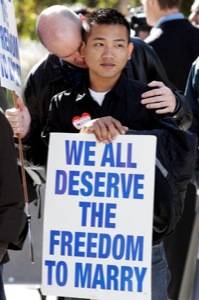san diego
Prop. 8 campaign wants to revoke same-sex marriages in California
An estimated 18,000 couples could be affected
Published Thursday, 17-Jun-2010 in issue 1173
In 2008, California voted on Proposition 8 which would repeal the decision to allow same-sex marriage and amend the California Constitution to define marriage as a union between a man and a woman. Under the banner of equality, supporters of same-sex marriage against Prop. 8 are once again hit with another campaign which will revoke the marriage status of an estimated 18,000 couples that were married between June and November of 2008.
Chief U.S. District Judge Vaughn Walker heard the closing arguments on Wednesday of a trial that began when two gay couples sued to overturn the proposition, citing that the measure violates the constitutional guarantee of equality and that it must be permanently banned. The sponsors of Proposition 8 are urging Judge Walker to revoke state recognition of 18,000 gay marriages that were granted during the time frame when gay marriage was legal in California. Andrew Pugno, an attorney for Prop. 8’s backers said in an interview with the San Francisco Chronicle that the sponsors aren’t “asking Walker to nullify the 18,000 marriages, but only to rule that government agencies, courts and businesses no longer have to recognize the couples as married.”
Walker heard 12 days of testimonies in her San Francisco courtroom in January from both supporters of the revoke and those against. Testimonies included the plaintiff couples, two women from Berkeley and two men from Burbank, as well as scholarly witnesses who testified about the history and meaning of marriage as well as the standing of gays and lesbians in society. Sending both sides a list of questions, Judge Walker heard the supporters of Prop. 8 argue about the reasons to define marriage traditionally – to protect the welfare of children, maintain social stability and honor the moral and religious views of voters.
“Moral disapproval of homosexual conduct is not tantamount to animus, bigotry or discrimination,” said Charles Cooper, lawyer for Protect Marriage, the Prop. 8 campaign organization. “On the contrary, religions that condemn homosexual conduct also teach love of gays and lesbians.”
The lead attorney of the plaintiffs who challenge Prop. 8, Theodore Olson, called the measure an “attempt to enforce private moral beliefs about a disfavored minority.” He pointed out that Roman Catholic and Mormon supporters had informed voters that same-sex marriage is immoral and exploited fears that gays menace children, claims that have proved to be unfounded.
Advocates for gay rights have argued that the unequal treatment of the GLBT community is grounds enough to overturn the ballot. But supporters of Prop. 8 believe that the best method of equally respecting both sides of this argument, as well as respecting voter decision, is to sustain Prop. 8 by giving it retroactive effect, meaning, deny recognition to pre-election marriages.
The trial concluded Tuesday with Judge Walker’s decision pending. The trial decision could potentially take weeks to arrive at.
|
|
Copyright © 2003-2025 Uptown Publications


